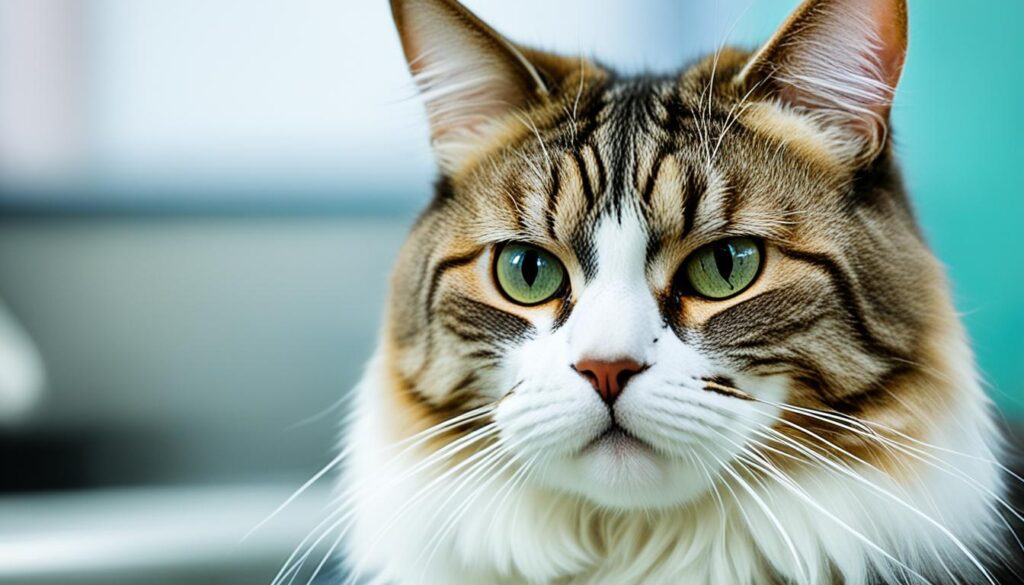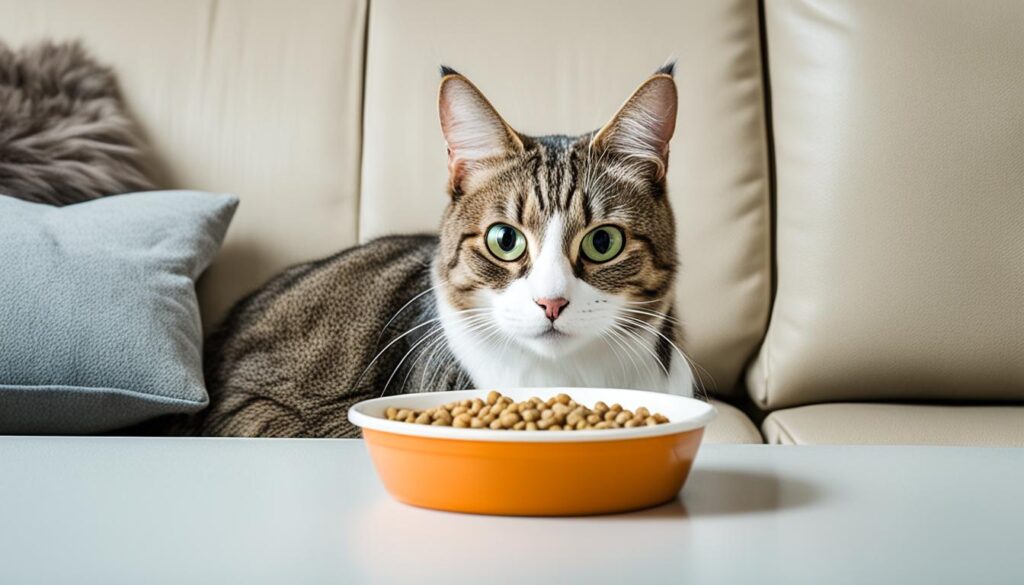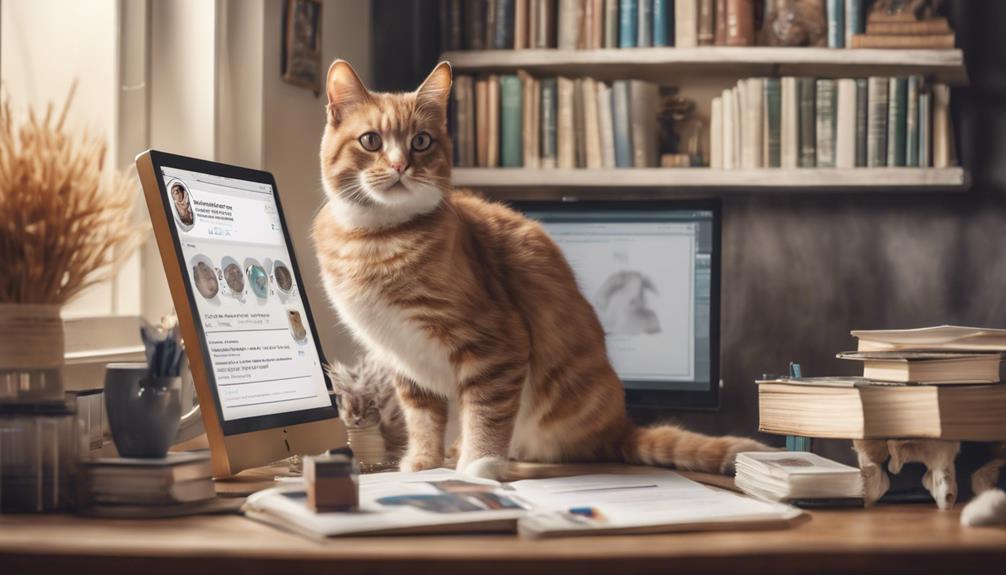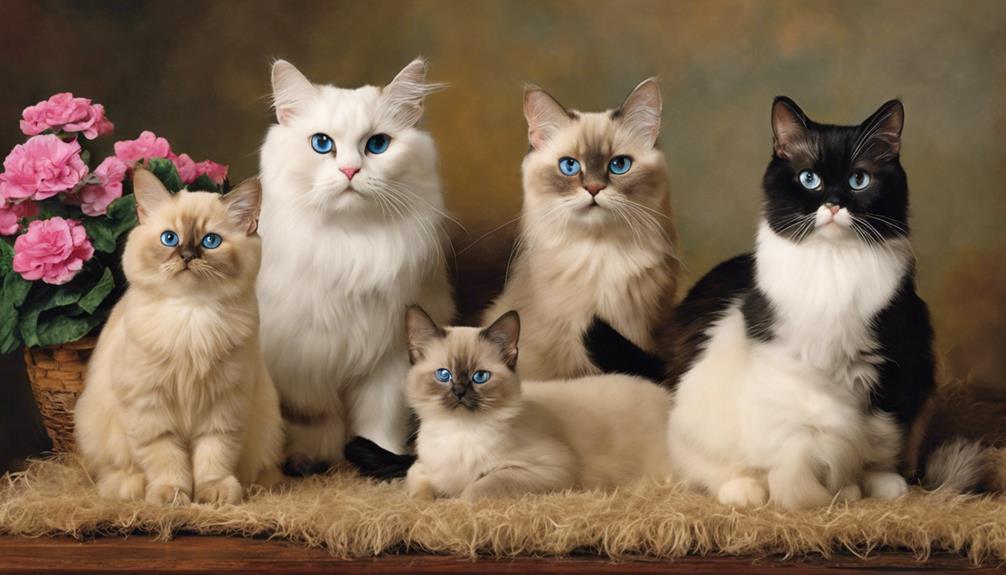Were you aware that unintentional weight loss in cats, particularly in senior cats, can be worrying? It’s more than just them skipping meals. In reality, weight loss in cats may signal an underlying health problem that needs to be addressed.
As loving cat owners, it’s important for us to understand the reasons behind our feline friends’ weight loss. By identifying the cause, we can take the necessary steps to address the issue and ensure their well-being. Let’s explore some of the possible reasons for weight loss in cats and learn how we can help them regain their healthy weight.
Key Takeaways:
- Unintentional weight loss in cats can be a sign of an underlying health issue.
- Causes of weight loss in cats include inadequate food intake, intestinal parasites, feline diabetes, hyperthyroidism, viral diseases, kidney disease, cancer, dental problems, anxiety/stress, and aging.
- Consulting with a veterinarian is crucial for diagnosing and treating the underlying cause of weight loss in cats.
- Early intervention and appropriate treatment can lead to better outcomes for weight loss in cats.
- Regular veterinary care, a balanced diet, and addressing any underlying health conditions are essential for maintaining a healthy weight in cats.
Not Getting Enough Food
Sometimes, cats may not be getting enough food due to various reasons. Other pets in the house, changes in the food brand, or difficulty accessing the food dish can all contribute to reduced food intake. It’s important to evaluate these factors and consult with a veterinarian to determine if any obstacles are hindering your cat from eating enough.
When there are other pets in the house, some cats may feel stressed or anxious during mealtime, leading to a decreased appetite. In multi-pet households, it’s important to create a calm and quiet feeding environment for your cat. Consider feeding your cat in a separate room or using feeding stations that are inaccessible to other pets.
Another reason for reduced food intake could be a change in the food brand. Some cats are sensitive to changes in their diet, and switching to a new brand abruptly may cause them to refuse the food. If you have recently changed your cat’s food brand, try gradually transitioning by mixing the new food with the old one. This will help your cat adjust to the new flavor and texture.
Additionally, the accessibility of the food bowl is crucial for cats. If your cat is older or has mobility issues, they may find it challenging to reach or eat from a high or narrow food dish. Consider using a shallow and wide bowl that is easily accessible for your cat. This will ensure that they can comfortably eat their food without any difficulties.
Consulting with a veterinarian is essential when your cat is not eating enough. They can provide guidance on the best feeding practices, recommend food options that suit your cat’s preferences and nutritional needs, and assess if any underlying health issues are causing the reduced food intake.
| Reasons for Not Getting Enough Food | Recommendations |
|---|---|
| Presence of other pets during mealtime | Feed the cat in a separate room or use separate feeding stations |
| Change in food brand | Transition gradually to the new food by mixing it with the old brand |
| Inaccessible food bowl | Provide a shallow and wide food bowl that is easily accessible |

Intestinal Parasites
Intestinal parasites are a common issue in cats and can lead to weight loss if not addressed promptly. These parasites, such as cat worms, can be acquired through various sources, including hunting, prey consumption, or ingesting contaminated substances.
If your cat is experiencing weight loss and you suspect the presence of intestinal parasites, it is crucial to seek veterinary assistance. A fecal examination is typically performed to confirm the presence of parasites.

Once the presence of parasites has been confirmed, your veterinarian will recommend an appropriate deworming treatment. This treatment will help eliminate the parasites and restore your cat’s health.
Common Intestinal Parasites in Cats:
| Parasite | Overview |
|---|---|
| Roundworms | A common type of intestinal parasite that can be transmitted through infected prey or contaminated environments. They can cause weight loss, vomiting, diarrhea, and a pot-bellied appearance. |
| Tapeworms | These parasites are typically acquired by ingesting infected fleas or prey. They can cause weight loss, abdominal discomfort, and the presence of rice-like segments in the feces. |
| Hookworms | Commonly found in kittens, hookworms can cause weight loss, anemia, and bloody diarrhea. Cats can contract hookworms through contact with contaminated soil or infected animals. |
| Whipworms | Whipworms infect the large intestine of cats and can cause weight loss, bloody diarrhea, and inflammation. They are typically acquired by ingesting contaminated substances or through contact with infected animals. |
It is important to address intestinal parasites promptly to prevent further complications and keep your cat healthy. Regular deworming and maintaining a clean environment can help minimize the risk of reinfection.
Feline Diabetes
Diabetes is a common condition in cats that can have serious health implications. Cats with diabetes often display symptoms such as excessive thirst, increased urination, and unexplained weight loss. If you notice these signs in your cat, it’s important to seek veterinary care for a proper diagnosis and treatment plan.
Detecting feline diabetes requires thorough examination and testing by a veterinarian. Blood and urine tests are typically conducted to assess glucose levels and identify any abnormalities. These diagnostic tests help determine the severity of the condition and guide the treatment approach.
Once a cat is diagnosed with diabetes, managing the condition becomes crucial. This involves making dietary changes to control blood sugar levels and administering insulin if necessary. Your veterinarian will provide guidance on the appropriate diet for your cat and teach you how to administer insulin injections if required.
Regular monitoring of your cat’s blood sugar levels and periodic veterinary check-ups are essential to ensure the diabetes is under control. Additionally, it’s important to observe your cat for any changes in behavior or symptoms that may indicate fluctuations in their condition.
“Diabetes is a common condition in cats that can lead to weight loss. Cats with diabetes often display symptoms like excessive thirst, increased urination, and unexplained weight loss.”
Proper management of feline diabetes can significantly improve your cat’s quality of life. With the right care and attention, many cats with diabetes can lead long, happy, and healthy lives.
Remember, early detection and intervention are key when it comes to feline diabetes. If you notice any symptoms or changes in your cat’s behavior, consult with your veterinarian promptly to ensure the best possible outcome for your beloved feline companion.

Feline Hyperthyroidism
Feline hyperthyroidism is a common condition that affects the thyroid gland in cats. The thyroid gland, located in the neck, produces hormones that regulate metabolism. However, in hyperthyroidism, the thyroid gland becomes overactive, leading to an increase in metabolism, weight loss, increased appetite, and other symptoms.
Some common symptoms of hyperthyroidism in cats include:
- Weight loss despite an increased appetite
- Increased thirst and urination
- Hyperactivity or restlessness
- Poor coat condition
- Vomiting or diarrhea
Diagnosing feline hyperthyroidism typically involves a thorough medical history, physical examination, and blood work. Blood tests are essential to measure the levels of thyroid hormones in the cat’s system. Additionally, other diagnostic tests, such as a thyroid scan or ultrasound, may be performed to confirm the diagnosis.

Treatment options for feline hyperthyroidism may include:
- Medication: Anti-thyroid medications can be prescribed to regulate the production of thyroid hormones and manage the symptoms of hyperthyroidism.
- Special Diets: Some specially formulated diets can help control the symptoms of hyperthyroidism. These diets are low in iodine, which is essential for thyroid hormone production.
- Radioactive Iodine Treatment: This is a highly effective treatment option that involves administering a radioactive iodine injection, which selectively destroys the overactive thyroid tissue.
It’s important to consult with a veterinarian for proper diagnosis and treatment of feline hyperthyroidism. Effective management of this condition can help alleviate symptoms and improve the overall well-being of your cat.
Feline Viral Disease
When it comes to weight loss in cats, viral diseases can be a significant factor. Feline immunodeficiency virus (FIV), feline leukemia virus (FeLV), and feline infectious peritonitis (FIP) are three viral infections that can result in weight loss. These diseases weaken the immune system, making cats more susceptible to various health complications.
Diagnosing feline viral diseases involves thorough examinations and tests to identify specific symptoms. Treatment plans vary based on the severity of the infection, the cat’s overall health, and the presence of any secondary conditions.
Managing weight loss in viral diseases requires a holistic approach. This includes addressing the underlying viral infection, reducing symptoms, and supporting overall well-being. Veterinary care plays a vital role in helping cats regain their health and weight.
| Viral Disease | Key Features | Treatment |
|---|---|---|
| Feline Immunodeficiency Virus (FIV) | Progressive weakening of the immune system, weight loss, increased susceptibility to other infections. | Supportive care, management of secondary infections, antiviral medications (in some cases). |
| Feline Leukemia Virus (FeLV) | Impaired immune system, anemia, weight loss, increased risk of cancer. | Supportive care, management of secondary conditions, antiviral medications (in some cases). |
| Feline Infectious Peritonitis (FIP) | Progressive viral infection affecting multiple organ systems, weight loss, fluid accumulation. | Treatment options are limited. Supportive care aims to manage symptoms and improve the cat’s quality of life. |
Early detection, prompt treatment, and ongoing monitoring are essential for cats with viral diseases. Your veterinarian can provide guidance on managing weight loss and improving overall health in cats affected by these viral infections.

Feline Kidney Disease
Kidney disease, also known as renal disease, is a common condition that affects older cats and can contribute to weight loss. Cats with kidney disease may exhibit several symptoms, including increased thirst, frequent urination, and lack of appetite. If you’ve noticed these signs in your furry companion, it’s crucial to seek veterinary care for a proper diagnosis and treatment plan.
To diagnose kidney disease, your veterinarian will conduct a thorough examination that may include blood work and urinalysis. These tests help assess kidney function, identify any abnormalities, and determine the appropriate course of action. In some cases, imaging studies such as ultrasounds or X-rays may be necessary to further evaluate the kidneys.
The treatment for feline kidney disease typically involves a combination of dietary changes, medication, and fluid therapy. A specialized kidney-friendly diet can help manage the condition by reducing the workload on the kidneys and controlling related symptoms. Medications may be prescribed to address specific aspects of the disease, such as controlling blood pressure or promoting urine production. In some cases, fluid therapy administered either subcutaneously or intravenously may be necessary to support hydration and electrolyte balance.
It’s important to note that while kidney disease cannot be cured, early detection and intervention can help slow its progression and improve your cat’s quality of life. Regular veterinary check-ups and ongoing monitoring are essential to evaluate kidney function, adjust treatment as needed, and manage any complications that may arise.
If you suspect your cat may be suffering from kidney disease, consult with your veterinarian to develop a suitable treatment plan tailored to their specific needs.
| Symptoms of Feline Kidney Disease | Significance |
|---|---|
| Weight loss | One of the most common signs of kidney disease, as the condition affects appetite and nutrient absorption. |
| Increased thirst | The kidneys’ ability to concentrate urine is compromised, leading to increased water intake. |
| Increased urination | The kidneys’ ability to concentrate urine is reduced, resulting in increased urine production. |
| Lack of appetite | Loss of interest in food is often observed due to nausea, mouth ulcers, or imbalances in electrolytes. |
Feline Cancer
One of the potential causes of weight loss in cats is feline cancer. Just like in humans, cancer can affect various organs and systems in cats, leading to weight loss and other symptoms.
Diagnosing feline cancer requires a series of diagnostic tests to determine the type and stage of cancer. These tests may include:
- Blood work: Blood tests can help detect any abnormalities that may indicate the presence of cancer.
- Urinalysis: Urine analysis can provide valuable insights into the overall health of the cat and help identify potential cancer-related issues.
- X-rays: X-rays can be used to visualize the internal structures of the cat’s body and identify any tumors or abnormalities.
- Ultrasounds: Ultrasound imaging can provide a more detailed examination of the internal organs and help determine the extent of the cancer’s spread.
- Biopsies: Biopsies involve the collection of tissue samples for examination under a microscope to determine if cancer cells are present.
Once a diagnosis is confirmed, the veterinarian will develop a treatment plan that is tailored to the specific type and stage of cancer. Treatment options may include surgery, chemotherapy, radiation therapy, or a combination of these approaches.

In some cases, palliative care may be recommended to manage pain and improve the cat’s quality of life. Regular monitoring and follow-up appointments will be necessary to assess the progress of the treatment and make any necessary adjustments.
It’s crucial to remember that feline cancer is a serious condition that requires professional veterinary care. If you notice unexplained weight loss or any other concerning symptoms in your cat, consult with a veterinarian as soon as possible for an accurate diagnosis and appropriate treatment.
Dental Problems
Cats can experience various dental issues that can lead to weight loss. These issues include gum disease, resorptive lesions, and tooth fractures. When dental problems occur, it can make eating painful or difficult for your cat, resulting in decreased appetite and weight loss.
Aside from weight loss, there are other symptoms that may indicate dental problems in cats. These symptoms include bad breath, drooling, bleeding from the mouth, or difficulty eating.

Preventing Dental Problems
To prevent dental issues in cats, it’s important to establish regular dental care routines. Brushing your cat’s teeth regularly with cat-friendly toothpaste can help remove plaque and prevent gum disease. Additionally, providing dental chew toys or dental treats can help maintain your cat’s oral health.
Regular dental check-ups with a veterinarian are essential to detect and treat dental problems early on. A veterinarian can perform a thorough dental examination, including dental cleanings and extractions if necessary.
Diet and Dental Health
The type of food your cat eats can also impact their dental health. Feeding your cat a dental-specific diet or food that promotes dental health can help prevent dental problems. These diets are designed to scrape away tartar and plaque from the teeth, promoting good oral hygiene.
| Dental Issues | Symptoms |
|---|---|
| Gum disease | – Bad breath – Red, swollen, or bleeding gums – Loss of appetite |
| Resorptive lesions | – Difficulty eating – Drooling – Weight loss |
| Tooth fractures | – Discomfort or pain while eating – Chewing on one side of the mouth – Respiratory problems (in severe cases) |
If you notice any signs of dental issues in your cat or suspect weight loss due to dental problems, it is important to seek dental care from a veterinarian. Prompt treatment and preventive measures can help maintain your cat’s dental health and overall well-being.
Anxiety, Stress, or Disease
Anxiety, stress, and certain diseases can contribute to stress-related weight loss in cats. Cats are sensitive creatures, and changes in their environment such as household dynamics, noise, or conflicts with other pets can cause a decrease in appetite. It’s important to understand that cats can experience anxiety just like humans do, and it can manifest in various ways, including changes in eating habits and weight loss.
In addition to stress, various diseases can also lead to weight loss in cats. Conditions such as cancer and gastrointestinal issues can have a significant impact on a cat’s weight. It is crucial to recognize the symptoms of anxiety in cats, such as excessive grooming, hiding, aggression, or excessive vocalization. Similarly, maintaining awareness of symptoms such as unexplained weight loss, changes in stool quality, or vomiting can help identify potential diseases causing weight loss.
In order to manage stress-related weight loss and address potential diseases, it is important to consult with a veterinarian. They can provide a thorough examination, conduct tests, and recommend appropriate treatment options. Remember, early detection and intervention are crucial in maintaining the health and well-being of your furry companion.

Common Symptoms of Anxiety in Cats
| Symptom | Description |
|---|---|
| Excessive grooming | Cats may excessively groom themselves when they are anxious or stressed. |
| Hiding | Cats may seek out hiding spots to escape from stressful situations. |
| Aggression | Some cats may display aggression when they are anxious or feel threatened. |
| Excessive vocalization | Cats may meow excessively or make other vocalizations when they are stressed or anxious. |
Aging and Weight Loss in Cats
As cats age, it is not uncommon for them to experience weight loss. This can be attributed to a natural loss of muscle mass. However, it’s essential to be aware that aging cats are also at a higher risk of developing certain health conditions that can contribute to weight loss. Regular health screenings and visits to the veterinarian play a crucial role in early detection and management of these conditions.
Health Conditions Associated with Weight Loss in Aging Cats
While weight loss is a normal part of the aging process in cats, it’s important to monitor their overall health. Older cats are more prone to developing certain health conditions that may contribute to weight loss, including:
- Diabetes
- Kidney disease
- Hyperthyroidism
- Cancer
These conditions can significantly impact a cat’s weight and overall well-being. Regular health screenings, including blood work and diagnostic tests, are crucial for identifying and managing these conditions effectively.
Benefits of Regular Health Screenings for Senior Cats
Regular health screenings for senior cats offer several benefits:
- Early Detection: Health screenings can help identify any underlying health issues at an early stage, allowing for prompt intervention and improved treatment outcomes.
- Preventative Care: Health screenings enable veterinarians to track changes in the cat’s health over time, providing an opportunity to address any potential issues before they become more severe.
- Customized Care: By conducting health screenings, veterinarians can tailor their treatment plans to meet the specific needs of the aging cat, ensuring optimal care and quality of life.
Conclusion
If you notice that your cat is losing weight, it is important to consult with a veterinarian for a thorough examination. Unintentional weight loss can indicate underlying health issues that require medical attention. Treatments for weight loss in cats vary depending on the cause, and early intervention can lead to better outcomes. Regular veterinary care, appropriate diet, and addressing any underlying conditions are essential for maintaining a healthy weight in cats.








